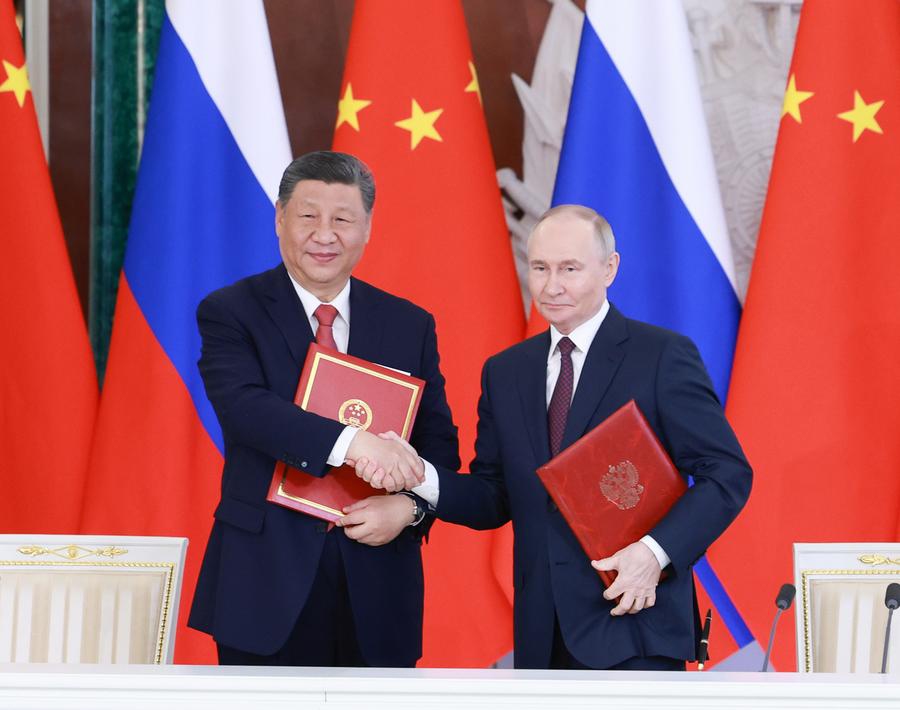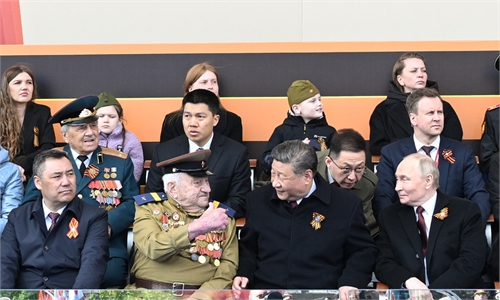These joint statements carry significance of the times beyond bilateral scope: Global Times editorial

Chinese President Xi Jinping and Russian President Vladimir Putin sign a joint statement on further deepening the China-Russia comprehensive strategic partnership of coordination for a new era after their talks at the Kremlin in Moscow, Russia, May 8, 2025. (Photo: Xinhua)
On Friday local time, Chinese President Xi Jinping and leaders from over 20 countries and international organizations were invited to attend a ceremony in Moscow to commemorate the 80th anniversary of the victory in the Soviet Union's Great Patriotic War. A day earlier, President Xi and Russian President Vladimir Putin signed a joint statement on further deepening the China-Russia comprehensive strategic partnership of coordination for the new era. They also issued a joint statement on global strategic stability and a joint statement on further strengthening cooperation to uphold the authority of international law, among others. These agreements not only inject fresh momentum into China-Russia relations but also reflect the two countries' shared responsibility in safeguarding the legacy of World War II (WWII) and contributing to the construction of global governance and human progress.Some US media have noted that during his meeting with Putin, Xi stated that China and Russia would work together to promote "an equal and orderly multipolar world" and "a universally beneficial and inclusive economic globalization." However, the US has withdrawn from multiple UN agencies and international organizations and disrupted global markets through trade war threats. The international community established the UN from the ruins of WWII to break away from the law of the jungle and pursue a new world order where all nations - regardless of size, strength, or wealth - are equal.
However, the pursuit of peace and development still has a long way to go. This is precisely because some countries have recently abused "long-arm jurisdiction," drawn ideological lines or invoked a so-called "rules-based international order" to justify hegemonic behavior. They treat the UN system opportunistically - embracing it when convenient and abandoning it when not - reneging on agreements, withdrawing from organizations, and even suspending funding. All of these have exacerbated the concerns of the international community. The statements made by China and Russia are essential for maintaining the core position of the UN and the authority of international law, and represent the demands of the world, especially the vast number of Global South countries, for fairness and justice.
In the 80 years since the guns of WWII fell silent, the world has largely enjoyed peace. Economic globalization has enabled many countries to ride the "express train of development," and the "peace dividend" has been shared by billions across the globe. Yet, in recent years, with the rising of unilateralism and hegemonism, certain countries, particularly nuclear powers, have established or expanded permanent military bases near other nuclear-weapon states' sensitive regions and sought to weaponize outer space - moves that fundamentally undermine the logic of strategic balance and violate the principle of equal and indivisible security. As a result, the current international system faces both a governance deficit and a legitimacy crisis. From this perspective, the world expects responsible major powers to serve as anchors of stability. Building a comprehensive, integrated and sustainable security throughout the world should be the common pursuit of all peace-loving nations.
History is a mirror from which humanity should draw lessons to avoid repeating past calamities. Since the founding of the UN and the constant improvement of the global governance system, the international community is increasingly recognizing that certain interest groups, by attempting to replace international law with their own "club rules" or "house rules" and applying double standards to international rules, are only fueling conflict and instability. In contrast, equal consultation and mutually beneficial cooperation represent the right path toward safeguarding global peace and development.
Amid accelerating changes unseen in a century, China and Russia have jointly promoted the establishment of the Shanghai Cooperation Organisation and mechanisms such as BRICS, while engaging in effective coordination within multilateral frameworks like the UN and the G20.
In addition, China is a member of almost all universal intergovernmental organizations and a party to over 600 international conventions and their amendments. China and other Global South countries are jointly advancing toward modernization and making genuine efforts to promote an equitable, orderly multipolar world for the benefit of all nations and an inclusive, balanced economic globalization to bring prosperity to people across the globe.
China was the first country to sign the UN Charter and is a permanent member of the UN Security Council. It has always supported the UN in playing a central role in international affairs and is committed to promoting global governance toward a fairer and more just direction. For a long time, China has remained a builder of world peace, a contributor to global development, and a guardian of global order, consistently pursuing the path of peaceful development.
President Xi's vision of building a community with a shared future for mankind, along with the three global initiatives he proposed, offers Chinese solutions for reforming and improving global governance. Advancing high-quality cooperation under the Belt and Road Initiative continues to inject strong momentum into global modernization efforts.
As the Chinese proverb goes, "Virtue is not left to stand alone. He who practices it will have neighbors." UN Secretary-General António Guterres has repeatedly praised China's contributions to the world, and more and more countries now recognize China as a key force for maintaining global peace and stability. This is because China stands on the right side of history, on the side of the progress of human civilization.
The victory 80 years ago was not only a military triumph but also a victory of justice over evil, of light over darkness. Peace over war, cooperation over confrontation, and progress over regression are the enduring pursuits of human society. A just and equitable international order has long been a shared aspiration of humankind since modern times.
As history marches forward, people all hope to see a more peaceful, fair world that prospers together. Time will also prove that only by jointly upholding the international system with the UN at its core, the international order based on international law, and the fundamental norms of international relations grounded in the purposes and principles of the UN Charter, and by safeguarding international fairness and justice, can we turn the Charter's aspiration - "to save succeeding generations from the scourge of war, which twice in our lifetime has brought untold sorrow to mankind," - into reality.


